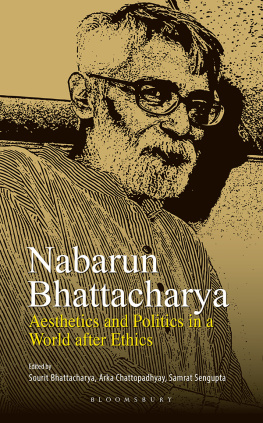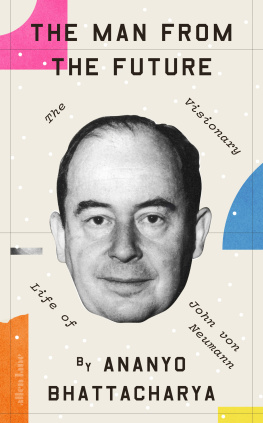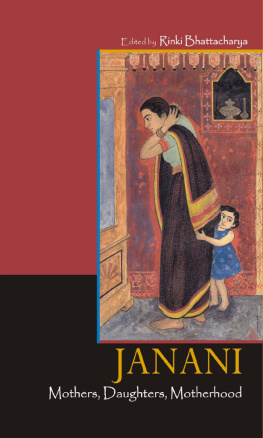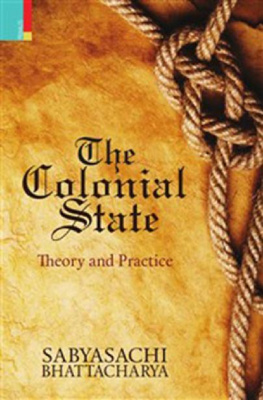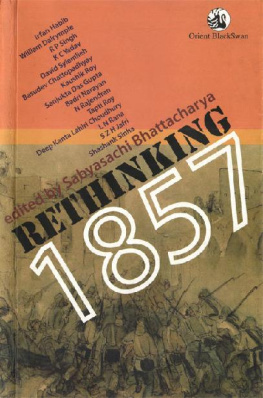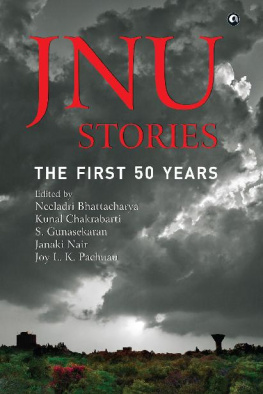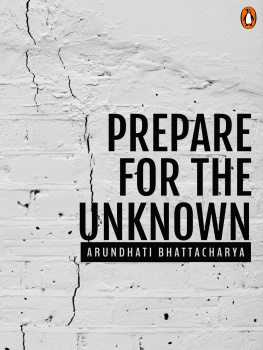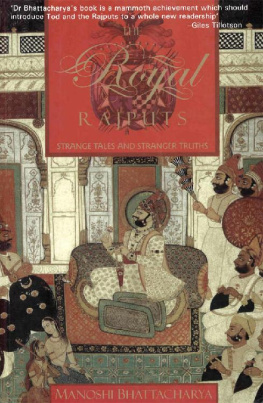Bhattacharya Sourit - Nabarun Bhattacharya : Aesthetics and Politics in a World after Ethics
Here you can read online Bhattacharya Sourit - Nabarun Bhattacharya : Aesthetics and Politics in a World after Ethics full text of the book (entire story) in english for free. Download pdf and epub, get meaning, cover and reviews about this ebook. year: 2020, publisher: Bloomsbury Publishing India Pvt. Ltd., genre: Detective and thriller. Description of the work, (preface) as well as reviews are available. Best literature library LitArk.com created for fans of good reading and offers a wide selection of genres:
Romance novel
Science fiction
Adventure
Detective
Science
History
Home and family
Prose
Art
Politics
Computer
Non-fiction
Religion
Business
Children
Humor
Choose a favorite category and find really read worthwhile books. Enjoy immersion in the world of imagination, feel the emotions of the characters or learn something new for yourself, make an fascinating discovery.
- Book:Nabarun Bhattacharya : Aesthetics and Politics in a World after Ethics
- Author:
- Publisher:Bloomsbury Publishing India Pvt. Ltd.
- Genre:
- Year:2020
- Rating:5 / 5
- Favourites:Add to favourites
- Your mark:
- 100
- 1
- 2
- 3
- 4
- 5
Nabarun Bhattacharya : Aesthetics and Politics in a World after Ethics: summary, description and annotation
We offer to read an annotation, description, summary or preface (depends on what the author of the book "Nabarun Bhattacharya : Aesthetics and Politics in a World after Ethics" wrote himself). If you haven't found the necessary information about the book — write in the comments, we will try to find it.
Nabarun Bhattacharya : Aesthetics and Politics in a World after Ethics — read online for free the complete book (whole text) full work
Below is the text of the book, divided by pages. System saving the place of the last page read, allows you to conveniently read the book "Nabarun Bhattacharya : Aesthetics and Politics in a World after Ethics" online for free, without having to search again every time where you left off. Put a bookmark, and you can go to the page where you finished reading at any time.
Font size:
Interval:
Bookmark:

This is an exceptional and painstaking work of rare dedication that is structurally expansive and conceptually rigorous. Most significantly, the editors and the team of translators, interviewers and critical essayists have elegantly woven a complex tapestry of aesthetics, politics and ethics that marks one of the most involved, committed and intricate authors of our time. The book radiantly brings to light the myriad trajectories through which Nabarun Bhattacharya was able to catch and express the deepest undertones of our overwrought times.
Beneath that tale lies another layerthat, like all true political prophets, Bhattacharya could presciently prefigure and predictan ominous and macabre sublunar future, the contours of which continue to remain spectral and contingent.
Professor Prasanta Chakravarty,
Department of English, University of Delhi
This is a timely introduction to Nabarun, a major activist writer of minor literature, inhabiting the borderlands of the ubiquitous modern order of capital, in the space-time of contemporary Kolkata. The book contains short stories, poems, an interview with the writer and essays on hima well-curated collection, offering a rounded representation of Nabarun. As the book highlights, the deep subaltern denizens of Nabaruns world may be voided of agency and use but cant be voided of the imagination of freedom. Through the intervention of this text, Nabaruns radical insight and technologies of posthuman praxis will be available widely, inspiring many versions of another kind of life, a plural participatory anarchy of friendship.
Debashish Banerji,
Haridas Chaudhuri Professor of Indian Philosophies and Cultures and Doshi Professor of Asian Art, California Institute of Integral Studies (CIIS), San Francisco, CA
Nabarun Bhattacharya
Nabarun Bhattacharya
Aesthetics and Politics in a World after Ethics
Edited by
Sourit Bhattacharya, Arka Chattopadhyay and Samrat Sengupta

BLOOMSBURY INDIA
Bloomsbury Publishing India Pvt. Ltd
Second Floor, LSC Building No. 4, DDA Complex, Pocket C 6 & 7,
Vasant Kunj New Delhi 110070
BLOOMSBURY, BLOOMSBURY ACADEMIC INDIA and the Diana logo are trademarks of
Bloomsbury Publishing Plc
First published in India 2020
This edition published 2020
Copyright Sourit Bhattacharya, Arka Chattopadhyay, Samrat Sengupta 2020
Sourit Bhattacharya, Arka Chattopadhyay, Samrat Sengupta have asserted their right under the Indian Copyright Act to be identified as Editors of this work
Bloomsbury Academic
An imprint of Bloomsbury Publishing Plc
All rights reserved. No part of this publication may be reproduced or transmitted in any form or by any means, electronic or mechanical, including photocopying, recording, or any information storage or retrieval system, without prior permission in writing from the publishers
Bloomsbury Publishing Plc does not have any control over, or responsibility for, any third-party websites referred to or in this book. All internet addresses given in this book were correct at the time of going to press. The author and publisher regret any inconvenience caused if addresses have changed or sites have ceased to exist, but can accept no responsibility for any such changes
ISBN: HB: 978-93-88630-49-8; eBook: 978-93-88630-51-1
2 4 6 8 10 9 7 5 3 1
Created by Manipal Digital Systems
Bloomsbury Publishing Plc makes every effort to ensure that the papers used in the manufacture of our books are natural, recyclable products made from wood grown in well-managed forests. Our manufacturing processes conform to the environmental regulations of the country of origin.
To find out more about our authors and books visit www.bloomsbury.com and sign up for our newsletters
Contents
This book on the aesthetics and politics of Nabarun Bhattacharya comes at a critical moment in global politics as in Indian history, one that might have drawn a savage, satirical response from Nabarun himself. Much of his work is haunted by a darkly prescient foreshadowing of postmodern apocalypse. Despite the cult status and devoted following Nabarun Bhattacharya enjoys in contemporary Bengali literary circles, this is to my knowledge the first extended study of his work in English, offering translations of primary sources (an interview with the author and several of his poems and stories) and eleven long critical essays, as well as an editorial introduction. The editors are to be congratulated on their devotion to a difficult task and the critical intelligence with which they have focused on the key features of Nabarun Bhattacharyas revolutionary aesthetics. These include his fierce dismantling of the illusions that sustain the capitalist culture; the black humour with which he subverts the conventions of realism while focusing on marginal existences, the lives of the underclass; his linguistic and generic inventiveness and, above all, his dissolution of the boundaries between human, non-human animal and thing.
The radical power of Nabarun Bhattacharyas vision, in a world after ethics, lies precisely in his moral interrogation of contemporary society, politics and art: in his awareness that a world founded on violence and exploitation is ultimately self-destructive, and that the oppressed will rise. In some ways this is figured by a recurrent image in his work, that of the explosionwhether of the human bomb or of a hidden stockpile of weapons. Yet, in a richly absurdist oeuvre, such explosions are rarely the product of conscious intention, of a revolutionary enterprise dedicated to the destruction of class enemies. Rather, they occur by accident or oversight, through the self-conflagration of incendiary material that has, we realise, accumulated over time. Thus, instead of a narrative of revolutionary progress, of the kind that preoccupied his Communist forebears, Nabarun Bhattacharyas poetics are imbricated in a far bleaker landscape of waste, decay and deathin which we sense, as he writes in one of his poems, that:
Somethings burning
In front of everyone, right before your eyes,
Amidst all the people
Homeland!
For a Marxist poet, novelist and political commentator, writing in a dystopian world, one that has abandoned both the principles of social justice and the pretence of benign power, such a vision is compounded equally of melancholy and anarchic humour. Whether in the volume of poems with which he burst on the Bengali literary scene, Ei Mrityu Upatyaka Amar Desh Noy (This Valley of Death Is Not My Country, 1973), or in his first two novels, Harbart (1993) and Kangal Malsat (2003), Nabarun Bhattacharya sought to subvert the conventions of social realism that had ruled left-wing Bengali literary representation, replacing them by a rich medley of motifs taken from popular culture and occult practise, a language that freely employed slang and obscenity, and a vision of subaltern actors ascending to take their place in the sky as a tribe of Fyatarus, winged offenders against social propriety and complacency. The subversive task of the radical writer, as Nabarun sees it, is, thus, not to preach revolution, but to employ his aesthetics as a form of politics: to upset hierarchy by elevating the downtrodden, to unsettle bhadralok sensibility by scatological humour and to disenchant our technological urban utopias by imagining fantastic weapons of mass destruction.
In its choice of literary material as well as of critical themes, this book explores the many aspects of Nabaruns vision: its obsession with waste, filth and detritus, its focus on destruction and death, its vision of a dystopic city, its critique of class and caste and its use of language to subvert literary propriety. What is particularly striking, however, is its attention to a distinctive but little-explored aspect of his work, its post-humanist dissatisfaction with an anthropocentric universe, as expressed in a deep concern with the lives of non-human animals and of objects. Nabarun, always a cerebral and self-conscious writer, himself reflected on this concern, seeing itat least sometimesas a way of escape from the greed and rapacity of the human race that appears to have appointed itself the task of destroying our planet. In the novella
Next pageFont size:
Interval:
Bookmark:
Similar books «Nabarun Bhattacharya : Aesthetics and Politics in a World after Ethics»
Look at similar books to Nabarun Bhattacharya : Aesthetics and Politics in a World after Ethics. We have selected literature similar in name and meaning in the hope of providing readers with more options to find new, interesting, not yet read works.
Discussion, reviews of the book Nabarun Bhattacharya : Aesthetics and Politics in a World after Ethics and just readers' own opinions. Leave your comments, write what you think about the work, its meaning or the main characters. Specify what exactly you liked and what you didn't like, and why you think so.

